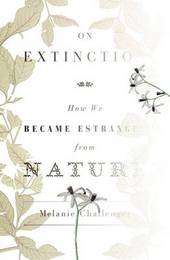
|
On Extinction: How We Became Estranged from Nature
Hardback
Main Details
| Title |
On Extinction: How We Became Estranged from Nature
|
| Authors and Contributors |
By (author) Melanie Challenger
|
| Physical Properties |
| Format:Hardback | | Pages:288 | | Dimensions(mm): Height 240,Width 158 |
|
| Category/Genre | Pets and the Natural World |
|---|
| ISBN/Barcode |
9781847081872
|
| Classifications | Dewey:576.84 |
|---|
| Audience | |
|---|
|
Publishing Details |
| Publisher |
Granta Books
|
| Imprint |
Granta Books
|
| Publication Date |
6 October 2011 |
| Publication Country |
United Kingdom
|
Description
How do we think about the things we have lost? How can we use what we know about extinctions - cultural, biological and industrial - to reconnect with nature? When the gigantic bones of mammoths were first excavated from the Siberian permafrost in the eighteenth century, scientists were forced to consider a terrifying possibility: many species that had once flourished on the Earth no longer existed. For the first time, humans had to contemplate the idea of extinction. Challenger became fascinated by this idea, and started to consider how we think about the things we have lost, and, indeed, how we come to lose them. She travels to the abandoned whaling stations of South Georgia, the melting icescape of Antarctica and the Inuit camps of the Arctic, where she traces the links between human activities and environmental collapse. On Extinction is an account of Challenger's journey that brings together ideas about cultural, biological and industrial extinction in a beautiful, thought-provoking and ultimately hopeful book.
Author Biography
Melanie Challenger is a freelance writer. She is the author of Galatea, her award-winning first collection of poems, and co-author, with Zlata Filipovic, of Stolen Voices, a history of twentieth century conflict compiled through war diaries. During her research for On Extinction, she was a Fellow of the AHRC Centre for the Evolution of Cultural Diversity at University College London from 2007-2010 and International Fellow at the British Antarctic Survey for International Polar Year 2007-2008. Her work was also a recipient of the British Council Darwin Awards.
|